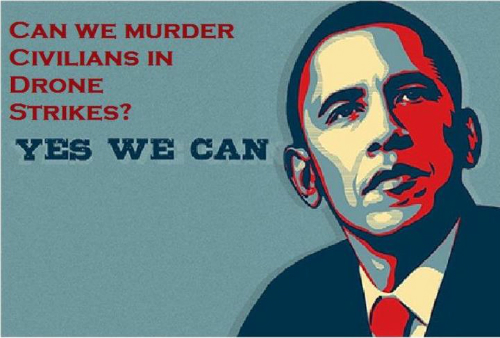 | ||
I am guessing that not many people have heard of Abdulrahman Al-awlaki. He was a 16-year old United States citizen killed by a drone attack in Yemen on October 14, 2011. You can see his Facebook page by typing his name in any search engine. I didn't know much about him until I read a letter by his grandfather and published in the New York Times several weeks ago. In the letter I learned that Abdulrahman liked to watch "The Simpsons," listened to hip-hop, and read "Harry Potter."
The missile launched from the drone blew his body to pieces, along with his teenage cousin and five other civilians at an open-air restaurant. The American public has known for some time that the Obama administration keeps a "kill list" of people suspected of terrorist activities, but officials claim that in this case Abdulrahman's death was an accident. To this day, the President refuses to provide an explanation or a personal apology.
It is bitterly ironic that President Obama could offer heart-felt words about the death of another young American boy, Trayvon Martin, after the man accused of his murder was acquitted. Upon the announcement of that verdict, Obama said, "He could have been me." Looking at another man's crime and expressing sympathy for the victim and the victim's family earned Obama a lot of press coverage. I can remember reading big, bold headlines about how Obama spoke from the heart about Trayvon Martin. Very soulful. But in the death of Abdulrahman, a case in which Obama shares a major responsibility, he refuses to be very soulful or even acknowledge his own crime.
Abdulrahman is a special case NOT because he was an American citizen killed by his own country. He is special because unlike most victims of U.S. drone attacks he has a name. A few days ago, a United Nations report headed by U.N. Special Rapporteur on Human Rights, Ben Emmerson, concluded that at least 400 Pakistani civilians have been killed by drone strikes over the past decade. The report also concludes that another 200 victims were "probable non-combatants." Do these nameless people somehow have less value, and therefore we should care less about them, because they are not U.S. citizens?
You can see Ben Emmerson interviewed on Democracynow.org. It is doubtful that any mainstream media outlets will be covering his report. Another voice not often heard in major media outlets, the investigative journalist Jeremy Scahill, is also interviewed on Democracynow.org. Because of reporters like Scahill we are coming to know more and more about the scale of these secret drone wars and their toll on civilian populations.
Many times, when they talk about such operations at all, government officials describe these drone attacks as "clean hits." They want us to believe that deaths of innocent bystanders are very limited. That conclusion looks doubtful at best and deceitful at worst. But even if we grant them that much--very few civilian casualties and only suspected terrorists killed--there would still be huge ethical considerations pressing upon us. One of the bedrock principles of American law, going back hundreds of years, is that suspected criminals are innocent until proven guilty. Our legal tradition maintains that the government must respect the rights of the accused and grant them due process.
Respect for the integrity and essence of Law is often considered to be a conservative value. In this case, I am a conservative too. When Presidents and their administrations get away with reckless disregard for human life and outright murder, it establishes a dangerous precedent. In terms of human rights and proper foreign relations, who could have guessed that Obama would be worse than Bush? Without serious consideration of these crimes and discussions about the drone attacks, you can bet the next President will be worse.

